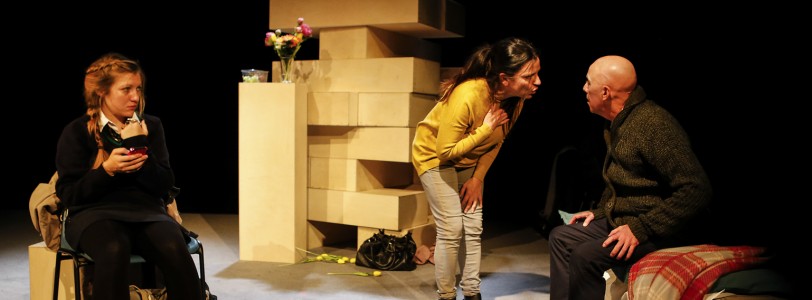Cathy is a Cardboard Citizens production, originally commissioned to celebrate the company’s 25th anniversary and to coincide with the 50th anniversary of Ken Loach’s documentary Cathy Come Home. Ali Taylor’s incredibly researched adaptation provides an all-too-real rendition of homelessness in the 21st century.
Cardboard Citizens are a theatre company that works with people who have experienced homelessness to share their stories. The production originally toured 25 cities in sold-out theatres, prisons and day centres. The company were invited to perform at the House of Lords and to present the Cathy Laws: legislation that audiences believed could revolutionise the housing situation in the UK. As a reimagining of the documentary, Cathy is a poignant look at homelessness, the relationship between a mother and teenage daughter and how the road from rent arrears, to sleeping on the number 25 bus happens all too quickly.
The version I saw was performed at the Soho Theatre with Cathy Owen as the brilliant titular Cathy, a protective and proud woman who fights for her small family. Her daughter, played by Hayley Wareham, embodies the sullen attitude of a teenage girl, even as her world comes crashing down around her ears; while Amy Loughton and Alex Jones provide a skilled rendition of their ensemble roles. Cathy and Danielle are a close family unit, Cathy wants nothing more than for Danielle to do well in her GCSEs and be able to go to college; she wants it too, if only to stop her mum haranguing her. Both women capture the essence of the complicated mother-daughter relationship, with their housing situation in crisis they are the only thing holding each other together. Although Cathy works a myriad of zero-hour jobs to make ends meet, it just isn’t enough for their landlord. After they are evicted the council refuses to offer them anywhere in London, Cathy’s speech begging for them to help her is heart-breaking. Despite doing everything she is supposed to; their only solution is to uproot her and Danielle. The council seem to believe that the solution is a two-bed in Newcastle, miles away from Cathy’s job, Danielle’s school, and Cathy’s father who is living with dementia in a local care home. They end up on the run from social services, changing sofas every night, before that eventually drives a wedge between the two women. Regardless of Cathy’s best efforts to prevent Danielle from being uprooted, it is eventually her desperation to keep them together that drives them apart.
This precarious balance, both between Cathy and Danielle, and of the housing system as a whole, is symbolised on set by a large Jenga block. Although it appears sturdy enough, it only takes a few blocks to be removed before it begins to collapse in on itself. It is used to make up the furniture of the set and is churlishly pushed over by Danielle when her relationship with her mother is pushed to its limit. It is also used as a backdrop to project testimonies and interviews from people who have experienced homelessness. This audio is played over scene changes and serves to abruptly bring you out of the story; whether intentional or not, it does drive home the real-life consequences of stories like Cathy’s.
As is to be expected from the subject matter, there is no pleasant resolution to this story. Cathy and Danielle are perhaps irreparably separated, and although Cathy has been offered a place to live, she is still miles away from her daughter. After the lights come up, Amy Loughton asks the audience one word to describe how they are feeling right now. The feeling that seemed to be synonymous through the audience was of anger, despair, and frustration with the system that allows this to be the norm. We were then asked to discuss, with an audience member we didn’t know, how we as individuals could affect homelessness. These personal actions have since been emailed weekly to everyone who has seen the show, in an attempt to actualise that change. This final part of the show turned it from a demoralising commentary on homelessness, into an impassioned shout for something to change.








0 Comments